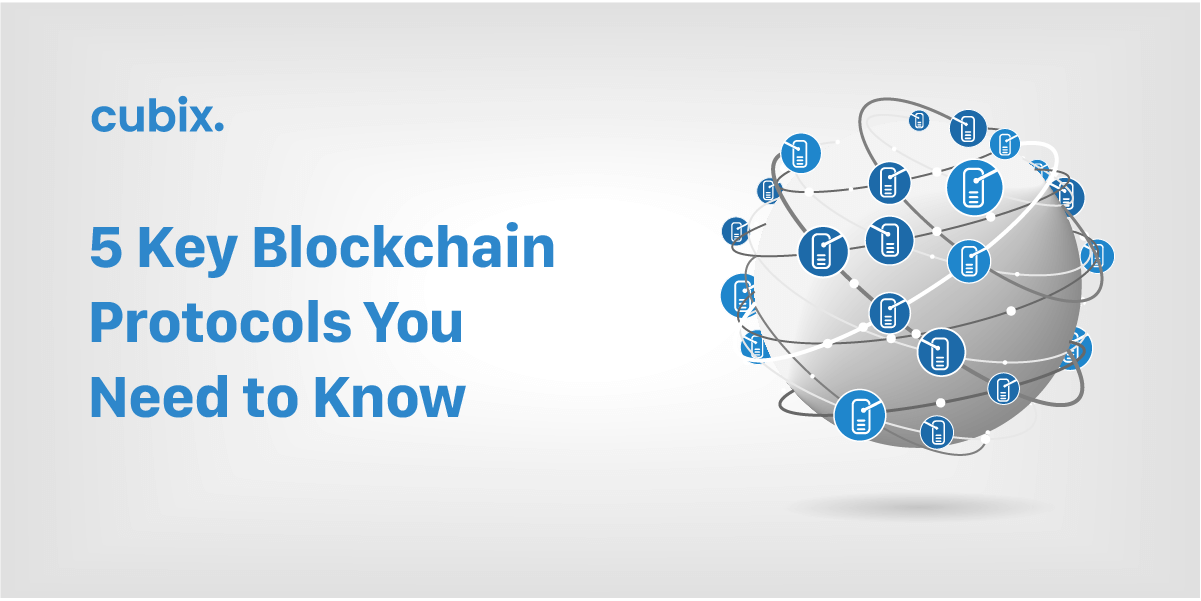Every industry needs a robust and full-fledged technology for significant growth. And seemingly, without blockchain in the game, it’s highly unlikely for any business to grow its way beyond.
Blockchain plays a crucial role in the industrial space to help achieve strategic, meticulous, and reliable goals. In short, blockchain adds value to your business infrastructure and all the other aspects included within.
If you’re interested in building robust and cutting-edge projects via blockchain, knowing the best crypto protocols is vital.
What Are Blockchain Protocols?
A simple protocol is defined to be the ruling method that carries out a radical task in a well-established organization. In the same way, Blockchain protocols are vital procedures for conducting blockchain-based endeavors. To endure a robust working framework in an organization, specific rules and guidelines are essential to accomplish that, which widely concern a company’s security and networking. Hence, they are also known as enterprise blockchain protocols, as they set out a decentralized approach in a whole network while excluding a significant influence.
In other words, these protocols are exercised to safely and securely transfer data among devices to preserve an efficient data flow. Although there’re different blockchain protocols, below is the list of top ones. However, it’s rudimentary to know all the enterprise blockchain protocol terminologies before we list the top blockchain protocols. So, let’s get to know them first!
Enterprise Blockchain Protocol Terminologies
Blockchain is crucial to each industry at this time and age, not to mention it enables a leading-edge approach within the industry for exponential progress. While the emergence of blockchain descended various elements of innovations, it’s still equipped to lead further – if we put it into creative uses. However, some key terminologies are widely used in the blockchain industry. So despite its booming nature among the sectors, you can still be a part of this actively researched term by knowing its commonly used terminologies.
They are as follows:
Distributed Ledger
To simply put it, a distributed ledger is a publicly accessed history of the transactions. Yes, anyone can view all the blockchain-based transactions ever so seamlessly. It enables participants to uphold effortless communication and finalize any kind of accord. Also, conventionally known as a shared ledger, distributed ledger replicates, synchronizes, and shares data throughout the network.
Consensus Algorithm
Achieving a digital agreement is stress-free these days – wholly digitalized. Likewise, this consensus algorithm is used to streamline this process by creating a single data value among distributed methods. Moreover, it’s essential and deep-rooted into this network, helping validate data by blockchain-based blocks or nodes. It’s a standard procedure that makes genuine agreements among participants.
Smart Contracts
Achieving a digital agreement is stress-free these days – wholly digitalized. Likewise, this consensus algorithm is used to streamline this process by creating a single data value among distributed methods. Moreover, it’s essential and deep-rooted into this network, helping validate data by blockchain-based blocks or nodes. It’s a standard procedure that makes genuine agreements among participants.
Coins And Tokens
If you’re not a technical expert in the transactional domain of the blockchain, you may as well be constantly at risk of losing your valuable coins from the wallet. So, there is a convenient protocol to do this right: the proper knowledge of coins and tokens and how to handle them. It’s not just sending some coins around but changing ownership status. So, it is essential to know all the shebang of cryptic transactions.
51% Attack
Whenever there is a 51% influence over the network, which is more than half, those higher minorities have all the control over its computing powers. That includes consensus approval, payment barrier, reverse transaction, and more, although they’re not enabled to terminate the whole network. This short-time control can lead to unreliability, deacceleration, and undemanding.
Top 5 Blockchain Protocols
Hyperledger
To quickly deploy any blockchain-based technology, Hyperledger is quite handy. Too often, this protocol is used in the blockchain software solutions equipped with all the accelerated tools and libraries that quicken the process. Moreover, it’s designed to be publicly accessible – open-source, whereas viewable, modifiable, and distributable by its participants.
Hyperledger Protocol is highly useful for making enterprise blockchain solutions. It was founded in 2015, and over 260 organizations are building blockchain-based solutions followed by this protocol. When you need better and efficient handling of intellectual property, Hyperledger Protocol makes it incredibly possible.
Corda
Many enterprises need leading-edge technologies that ensure them an edge over their competitors. In the same way, Corda can become one of the reliable designs for enterprises that’ll help them address challenging problems, not to mention it was primarily designed just for that. Apart from that, organizations that are majorly submerged into the digital finance flow, it can lead them to advanced finance control and security.
Corda offers a game-changing probability since it’s cost-effective in record-keeping and development services. We cannot deny how this technology ensures the ultimate sight for sheer growth while contributing seamless transparency, validity, and traceability. What’s more? It helps, unlike any, make direct transactions via smart contract – effortlessly.
Multichain
Like Hyperledger, Multichain Protocol is also an open-source platform – contributing a range of APIs for fast deployments, although it mainly aims to create private applications for private industries. Recently, it has raised over $60 million in seed funding. It's similar to leading-edge technologies that evaluate businesses' needs and provide them with the right solutions.
When it comes to creating key-value and identity databases on the network, Multichain is the true fit for such business endeavors. In addition, it's capable of working in conjunction with fiat currencies and physical stores, which is pretty much what traditional businesses need. Multichain is a cross-chain infrastructure that, unlike any, links more public blockchains and crypto-assets at reduced prices.
Ethereum
You must have heard about Ethereum. If not, you should know it's a widely known blockchain platform that builds excellent decentralized apps. Even better, using Ethereum to create apps provides consumers control over the creation process without involving third-party entities. Across the internet globally, it's one of the widely used technologies that send and receive values directly to end-users.
It's a peer-to-peer network that has wide scalability for enterprises. For the payment methods, it's seamless and works smoothly. While you have different blockchain protocols mentioned herein, Ethereum has its own cryptocurrency named Ether, and which, by the way, is commonly used for valuable transactions.
Quorum
This is one of the leading frameworks contributing to wide-ranging enterprises for seamless growth. However, it’s very similar to Hyperledger and Ethereum – open-source and identical approach and infrastructure. Better performance, mature, enterprise-ready, community-driven, consensus mechanism – voting-based, improved transaction, and contract privacy- can help make an enhanced approach to advancements in the industrial zone. And Quorum is equipped with all of those.
Additionally, it is resourceful enough to work in the finance sector – like other blockchain-based protocols. You can develop various apps with Quorum, from in-house to third-party tools, although you need to authorize it by a specified entity before implementing it into your enterprise. Plus, it serves better than any trusted network.
Why Do You Need Blockchain Protocols?
In today’s time, blockchain has become one of the must-have technologies for any enterprise. It’s as essential as the whole enterprise infrastructure to help set an indestructible framework of data flow and control into an enterprise. That’s why, on no account, enterprises that tend to boost their steady growth with a securest approach cannot skip this technology. Not to mention all the well-known enterprises are using this cutting-edge technology.
Since its inception, it has remained leading across the globe. Almost every financial app development sector is running its safe wheels to advancement via blockchain, ensuring unshakable value in apps, games, finance, and much more. Accordingly, this technology comes with a lot of benefits. However, implanting this requires one to understand its protocols, whereas they aim to reinvent the traditional functions of industries by warranting less time, advanced resources, and effortless uses. Thereby, blockchain protocol is a feasible approach for robust digital solutions.
The Bottom Line
Incorporating these features can bring industrial versatility and strength more than anything to date, despite the fact that it’s exceedingly complex when we move towards its implementation. However, if you’re a trainee in this field of demeanor, learning basic concepts of the blockchain network is a reasonable starting point. So, after having a glimpse at the leading-edge blockchain protocols, you can now move past the initialization phase and commence with its practicality.
If you hoard a leading project in mind that requires the best technological implementation, such as blockchain, we, Cubix, can be your chaperon. Our team of professionals specializing in blockchain and blockchain solutions company can seamlessly help you build your blockchain-based project from the ground-up level. Formerly, we’ve successfully deployed ranging blockchain projects through our best veterans, having years of experience and understanding of this technology.
Get in touch with us! We’re just a ping away.

